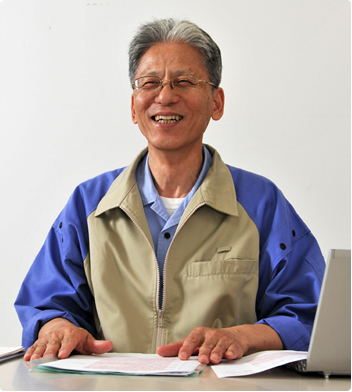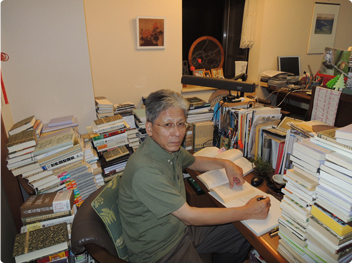The pleasure of collaboration with coworkers.
I want to hand down my experience and knowledge to younger generations.

In what activity are you engaged now?
I am a member of a working group dealing with component technologies, in charge of organizing and categorizing benchmarks pertaining to optical components, element technologies and patent strategies, and supporting various component development teams to assure they proceed smoothly. I will be happy if my experience and knowledge can help Nikon even a little in deciding its directions regarding manufacturing technologies and their research and development.
What do you think are the necessary qualifications to be a researcher?
First of all, researchers need to find interests in a variety of different subjects, and nurture a mind of curiosity. A researcher needs to find their object of study interesting. Otherwise, they will have no inspiration to keep exploring. Researchers are also required to think logically.
Do you have any advice to offer young researchers?
One needs to learn fundamental basics. But one must not look on them as merely theory or knowledge. One must learn how to make maximum use of them. If you are a researcher whose main concern is never to fail, and you cannot attain the expected results, you easily arrive at an impasse. It is always important to be prepared with alternative plans. The possibility of unforeseen failures must be recognized in the process of planning the experiment.
All of your advice is inspired by your own experiences?
Yes, indeed. The most important point to bear in mind is that one individual has a limit to what he or she can do. One needs to seek the cooperation of coworkers. In order to produce better results in this era of severe competition in technological development, distributing tasks and advancing projects effectively are essential. Conquering difficult problems in cooperation with your coworkers will bring about great pleasure.
As long as there's light, there are unlimited possibilities in the fields of glass and thin film.

Books piled high in Mr. Matsumoto's study
What is your hobby?
I enjoy comparative reading of an English book and its several translations. Currently, I am working on a Raymond Chandler book. I read his original The Long Goodbye and I am now reading a translation by Shunji Shimizu published in the 1950's and the 2007 version by Haruki Murakami.
That's a unique way of reading books!
In two different translations, the choice of words can be quite different. The meaning and nuances of words and sentences might be different from the original English. The personalities of translators and backgrounds of different eras are there to see. It is quite interesting. After that, I plan to make a comparative reading of the book, Farewell, My Lovely – in English, and then translations by the same Shunji Shimizu and Haruki Murakami.
Lastly, what do glass and thin film mean to you?
I feel that there are unlimited possibilities in glass and thin film. As I mentioned earlier, as long as there is light, new technologies for glass and optical thin film will be developed one after another. I will never be happier if I can contribute to the efforts and R&D of researchers who challenge the possibilities of such new technologies.
